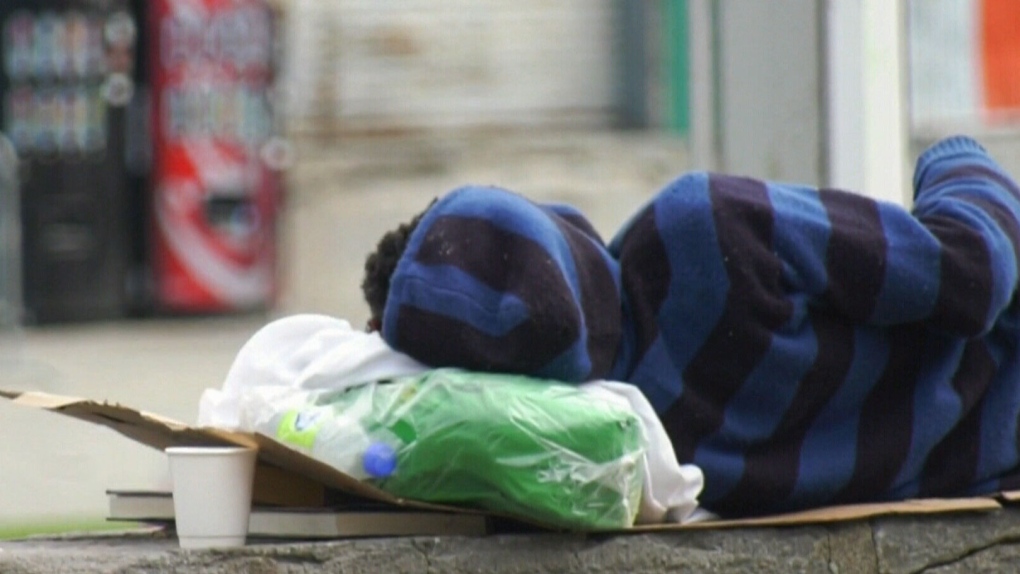New data sheds light on homelessness in Winnipeg

New data is shedding light on homelessness in Winnipeg, offering a snapshot into locations, available resources and demographics of those who are unsheltered or experiencing homelessness in the city.
The data was released as part of End Homelessness Winnipeg’s 2021 Interim Street Census Community Report, which gives a limited, time-specific look at homelessness in Winnipeg.
The information was collected over a 24-hour period from April 21 to 22, 2021, when project partners gathered data from emergency shelters, transitional housing, 24/7 safe spaces, resource centres, encampments and unsheltered locations. End Homelessness Winnipeg noted not every sheltering or transitional location participated in the survey.
“It’s just to get a sense of the demographics, the locations, the ages, the ethnicities of individuals that are currently unsheltered and experiencing homelessness throughout Winnipeg,” said Jason Whitford, president and CEO of the non-profit organization.
During this 24-hour snapshot, the group counted 1,127 people experiencing homeless in Winnipeg. This included 370 people who were unsheltered; 54 people at encampments; 300 people staying at emergency shelters; 229 people at 24-7 safe spaces; and 174 in transitional housing.
A map showed the majority of people staying at encampments and other unsheltered locations were in the North End and West End.
As for the occupancy at emergency shelters and safe spaces, End Homelessness Winnipeg reported there are four emergency shelter spaces, with a total of 360 beds – 300 of which are in use.
There are also four transitional housing spaces with a total of 232 beds – 174 of which are occupied
DEMOGRAPHICS
The data showed that 71 per cent of the people staying at emergency shelters, transitional housing and safe spaces were men, 27.5 per cent were female and one per cent were gender diverse.
In terms of age, four per cent were dependent youth between 0 to 18 years old, while 22 per cent were unaccompanied youth between 0 to 24 years old.
Forty-six per cent of people in emergency shelters, transitional housing and safe spaces were adults aged 25 to 49; 24 per cent were older adults aged 50 to 64; and four per cent were seniors over the age of 65.
The report noted 66 per cent of these people identified as Indigenous, two per cent identified as veterans, and 15 per cent experienced chronic homelessness.
“We need to have a more concentrated effort and resources and strategies that reflect Indigenous values, Indigenous processes, Indigenous philosophies,” Whitford said.
End Homelessness Winnipeg noted that the data was collected during the COVID-19 pandemic when the city was at the red (critical) level on the pandemic response system. As a result, End Homelessness Winnipeg said the findings can’t be directly compared to the Street Census Point in Time Count reports from 2015 to 2018.
“I think what happened during the pandemic is that people that were at or close to becoming homeless were sort of pushed over the edge throughout the pandemic because of, I think, health measures that were imposed, where you had to restrict visitors or restrict spacing or even to be more mindful of children, the elderly or people with weakened immune systems,” Whitford said.
CTVNews.ca Top Stories

Donald Trump says he urged Wayne Gretzky to run for prime minister in Christmas visit
U.S. president-elect Donald Trump says he told Canadian hockey legend Wayne Gretzky he should run for prime minister during a Christmas visit but adds that the athlete declined interest in politics.
Ho! Ho! HOLY that's cold! Montreal boogie boarder in Santa suit hits St. Lawrence waters
Montreal body surfer Carlos Hebert-Plante boogie boards all year round, and donned a Santa Claus suit to hit the water on Christmas Day in -14 degree Celsius weather.
Historical mysteries solved by science in 2024
This year, scientists were able to pull back the curtain on mysteries surrounding figures across history, both known and unknown, to reveal more about their unique stories.
Toronto shelter workers say holidays difficult time for refugee claimants
Workers on the front line of Toronto's homeless crisis say the holiday season has been tough for those living on the streets, as colder temperatures set in along with feelings of isolation.
Mother-daughter duo pursuing university dreams at the same time
For one University of Windsor student, what is typically a chance to gain independence from her parents has become a chance to spend more time with her biggest cheerleader — her mom.
Beyoncé turns NFL Christmas Halftime Show into a 'Cowboy Carter' party with Post Malone cameo
Hope your Santa hat was fastened, because Beyoncé gave us the ultimate 'Cowboy Carter' gift this Christmas.
Montreal man dead after boat explodes in Fort Lauderdale
A Montreal man is dead and several others are injured after a boat exploded in Fort Lauderdale, Florida.
Azerbaijani airliner crashes in Kazakhstan, killing 38 with 29 survivors, officials say
An Azerbaijani airliner with 67 people onboard crashed Wednesday near the Kazakhstani city of Aktau, killing 38 people and leaving 29 survivors, a Kazakh official said.
King Charles III focuses Christmas message on healthcare workers in year marked by royal illnesses
King Charles III used his annual Christmas message Wednesday to hail the selflessness of those who have cared for him and the Princess of Wales this year, after both were diagnosed with cancer.


































